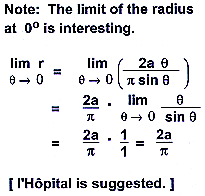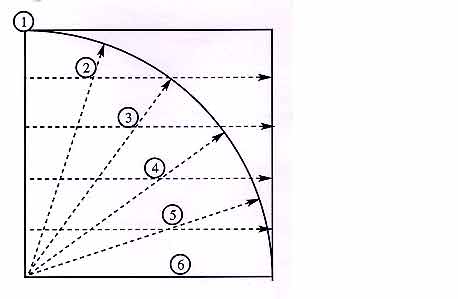Click on the thumbnail image for additional information. |
This section .
. .
The first known curve with dual motion. |
 |
Move the mouse over each of the numbers.

| Biographical Sketch:
Hippias (ca.
420 BC)
is one of
the first mathematicians about whom we have
extensive contemporary
information.
He was from Elis, a state in the northwest
corner of Peloponnesia, the
home of the ancient Olympic games.
According
to Plato, Later, in Athens, Hippias became one of the very first to teach in exchange for money. This practice was forbidden by the Pythagoreans and much degraded by Plato. He and other paid teachers were labeled with the derogatory term of being "sophists." Note the same linguistic root is in "sophomore." However, to contemporaries, the term meant "wise man." In Plato's Dialogues,sophists were described as itinerant teachers who wandered over Asia Minor seeking work. Some were undoubtedly charlatans. However, wealthy Athenians were more than willing to pay Hippias for educating their sons. In fact, Hippias even boasted that he earned more than any other two sophists combined. Scholars have suggested that perhaps Plato was envious of Hippias' good looks and his oratory skill of "making the worse appear better." Hippias' reputation in mathematics securely rests with establishing the first unique curve requiring more than a straight edge and compass. This is the first curve that must be plotted point by point. Moreover, its plotting requires dual motions generated over equal percentages of distances for two distributions. One might even argue that the Quadratrix of Hippias introduced the geometry associated with the Calculus of Variations. The curve is labeled "Quadratrix" for its attempt to turn curvilinear space into a rectangular area. |
|
Plato and Aristotle from Raphael's
School
of Athens.
|
 |
A Brief
Listing
of Classical References which should be in most
university libraries.
Boyer, Carl B. A History of Mathematics, various editions and publishers. Burton, David M., A History of Mathematics,WCB McGraw-Hill. Heath, Thomas. A History of Greek Mathematics, Oxford University Press. |
 |
|
|
|
|
|
|
 |



 Hippias
"boasted" that on one of his visits to the
Olympic games, all that he
wore
- his clothing, sandals, ring, and oil flask -
were all of his own
making.
Hippias
"boasted" that on one of his visits to the
Olympic games, all that he
wore
- his clothing, sandals, ring, and oil flask -
were all of his own
making.